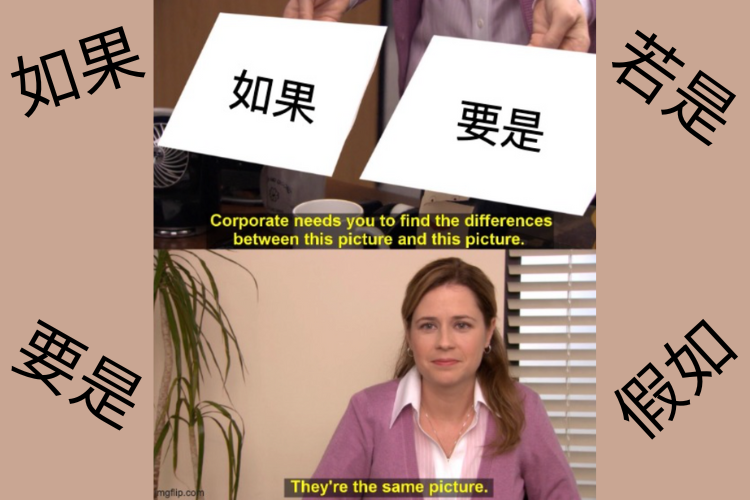The Four “if”s of Mandarin || 如果 Vs 要是 Vs 若是 Vs 假如
Note: If you are new to characters or generally want some support while working through the example sentences in the next sections, we HIGHLY recommend downloading this plugin! It will help a ton with character reading, both in this article, and on the greater web in general. If you’ve already installed it, carry on! :-)
There are many ways to say “if” in Chinese, and they all have very subtle differences. In this article we will help decipher the differences between words for “if”; 如果,要是,若是, and 假如.
TLDR:
如果,要是,若是 and 假如 are all ways of saying “if” in Chinese, with very subtle differences
All of these words for “if” can be used in the same few sentence structures
如果 is the most common and widespread word for “if”
要是 is also a common word for “if”, and can be used similarly to 如果, but is generally more colloquial
假如 is typically used as “provided…” or “in the case of…”, and is most often found at the beginning of a sentence
若是 is a formal way of saying “if”, typically found in academic papers and professional settings
Sentence Structures
No matter which term you’re using, all of these words for “if” can be used in the same sentence patterns that help organize your point more clearly.
如果/要是/假如/若是...就... (If... then...)
如果/要是/假如/若是...的话 (If...)
Note: here “的话” expresses a condition, so adding “的话” after a proposed “if” can translate to “under the condition that….”
如果/要是/假如/若是...的话,就... (If..., then...)
如果
如果 is the most common word for "if" in Chinese. It is a conditional word that is used to express a hypothetical situation or a condition. This is the word for “if” that you probably hear the most often. Here are some examples:
如果明天下雨,我们就不去公园了。(If it rains tomorrow, we won't go to the park.)
如果你累了,就休息一下。(If you're tired, take a break.)
如果你有时间的话,可以来我家玩。(If you have time, you can come to my house to play.)
要是
要是 is another way to say "if" in Chinese. It is similar to 如果 in meaning and usage, but it is considered to be more colloquial.
For example:
要是你不喜欢这个菜,我可以给你换一个。(If you don't like this dish, I can get you a different one.)
要是下雨了,我们就在家看电影吧。(If it rains, let's stay home and watch a movie.)
要是你有什么问题的话,可以问我。(If you have any questions, you can ask me.)
假如
假如 is yet another way to say "if" in Chinese, but can also translate to “provided” or “in case (of)…”.
For example:
假如你需要帮忙的话,可以随时找我。(If you need any help, you can contact me anytime.)
假如有紧急情况的话,可以打这个电话。(If there is an emergency, you can call this number.)
假如你不喜欢这个颜色的话,可以试试其他的颜色。(If you don't like this color, you can try other colors.)
如果 and 要是 are the more frequently used, colloquial ways of saying “if”. These are used in every day conversations, but 如果 you are looking to say “if” in an academic or professional tone, 若是 就是 your best bet -
若是
若是 is another word for "if", but it is more formal and literary than 如果 and 要是. It is often used in written language, such as in formal letters or academic papers.
Examples:
若是您有什么需要帮忙的地方,可以随时联系我。(If you need any help, you can contact me anytime.)
若是您有任何疑问的话,请随时问我。(If you have any questions, please feel free to ask me.)
To Conclude
如果, 要是, 若是, and 假如 are all ways to say "if" in Chinese, but they have very subtle differences in meaning and usage.
Though there are many ways of saying it, 假如你有问题,如果可能是你最好的选择!








